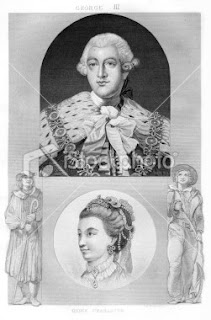Being lost in research is almost as good as reading a great novel, only I’m reading about real people and real customs. I’ve long been a fan of historical fiction, though I rarely read them these days. My research extravaganza is still under construction. It took some serious searching, which I learned to do when I was a medical transcriptionist, but I finally struck gold with this site,
Jane Austen’s World.
Here I hope to find everything I've ever needed to know about the Regency Period. I love to read, and I will be doing a lot of it in the weeks to come as I attempt to wrap my head around all the different aspects of British royal customs and expectations. I hope you will enjoy this new turn I’m taking in including you in my writing process in tandem with the journeys of our queen. As I promised before, I will include an expose of a piece of jewelry each week, as well. I look forward to this new format and the freedom it will allow me to give as much time as I need to research my subjects thoroughly.
For this week, I’d like to lay some groundwork for us. As we all know by now, no one becomes anything great (or otherwise) without the influence of influential people along their path. Psychologists say that our world views and coping mechanisms are firmly set in place by the age of five or six. This doesn’t mean that we are stuck; not in the least. It just means that these first years of our lives are very important, and depending on whether our life experiences were healthy or unhealthy, we may have a little bit or a lot to overcome in our adult years to enable us to function well in life and love.
And isn’t this the very essence of a transformed life? I was blind in the way I saw my actions as separate from the rest of the world, but now I see that everything I do causes a ripple effect for at least three other people, if not hundreds. I was lost in self-pity, but now I have found that taking responsibility for my actions is a far more joyful way to live. I was lame, stuck in the muck of my insecurities and weaknesses, but now I walk in freedom from the childish ways of my past.
Please don’t misinterpret the direction I’m taking here. I don’t believe there is any benefit in blaming our parents for all our problems, but it is important to understand the mindsets, motivations, world views, and coping mechanisms of those who are most prominent in our formative years. Of course, this includes our mothers and fathers, but also other adults or even children who impacted us during the first years of our lives.
Queen
Victoria’s mother and father were definitely the most important people in
Victoria’s young life. In addition to these two, there was also her uncle, William IV; her uncle, King Leopold of
Belgium; her uncle, George IV; and her mother’s comptroller, Sir John Conroy. Every single one of these people served as a transitional figure between the Georgian Era and the Victorian Era. Combined with the social climate, the laws of court, and the political climate of her day, these figures formed the psychological fabric of our queen.
See you next Wednesday!
~Angela














































